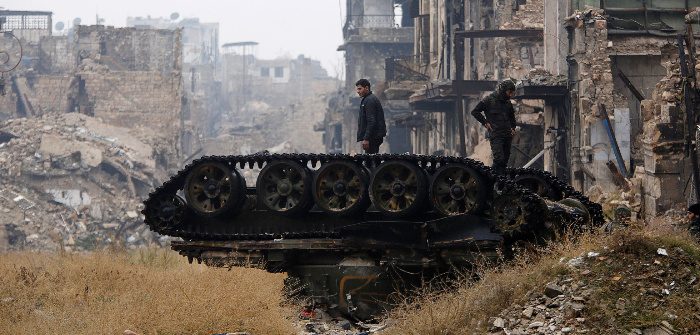Aleppo Shakes Arab World’s Foundations
Western impotence in Aleppo and the Syrian civil war, and the approaching victory of the Russian-Iranian alliance, is another sign of sweeping changes in the region’s political order.

Forces loyal to President Bashar Al-Assad in Aleppo, Syria, Dec. 13, 2016. Omar Sanadiki/Reuters
The fall of Aleppo to the coalition of Syrian-Iranian-Russian-Hezbollah forces this week is likely to be a symbolic and historical turning point amidst different eras. How events play themselves out will be determined in the same way as events in Syria have been determined: by the extent of the will or reluctance of individual men and women in power to use force to achieve their strategic aims.
Yet, as is usually the case in this situation in the Middle East, it is impossible to predict what happens next, or how different powers will behave. This is because of an ever-changing kaleidoscope of personalities, state interests, short-term alliances, and surprise indigenous developments like the sudden birth of the Islamic State two and a half years ago. Consequently, it is best to refrain from either the pomposity of giving advice to governments to act in this way or that, or the fortune-teller’s speculation of what we should expect to happen down the road.
We can, however, recall how many different countries and non-state actors behaved in the past decade or so, and reach conclusions about what the fall of Aleppo teaches us about our ways as men and women of the world in our era that simultaneously globalizes and pulverizes its own children.
Perhaps the first conclusion is that the post-Cold War era is finally over for real. The global dominance of the American-led Western system of life, governance, and international reach seems to have run into a serious obstacle in Syria during the past six years, after two decades of the U.S broadly doing whatever it deemed to be in its interest around the world. The deep irony in this is that hundreds of millions of people around the world are keen to go live in the United States and other Western societies, rather than in Russia, Iran, or Syria. So the battle underway is not for hearts and minds, it is for sheer will in the exercise of power, especially military force against hapless civilians.
The end of the post-Cold War era will usher in something new that we cannot possibly predict now. That will depend on the policy decisions of big powers like Russia and China, regional powers like Turkey, Saudi Arabia, Israel, and Iran, and local powers like Hezbollah, assorted Kurdish groups, and other such forces that have real clout in the region, especially because they tend to have a greater will to fight than others.
Also left behind us in a flurry of dust, blood, drones, and anguished social media messages is the concept of “the international community,” and a set or norms developed over the past century that sought to bring order and justice to the world. Aleppo and its people—along with tens of millions of other Syrians and vulnerable, bludgeoned citizens across many Arab countries—repeatedly but futilely asked the “international community” to protect them from the brutality of their own or neighboring governments, or distant drone operators, or wholesale aerial bombardments of urban neighborhoods, or sieges in urban areas in Syria, Gaza, Yemen, and elsewhere.
United Nations officials and sincere executives of global non-governmental humanitarian organizations added their voices to the dying citizens’ pleas for protection. When that failed, desperate men, women, and children asked only for some mercy, like a fast death. But protection and mercy were not to happen for the most part, except for pro-Syrian government citizens who enjoyed the protection of Russian, Iranian, and Hezbollah forces who came to their aid.
We must equally see as dead and gone the idea of an official Arab order which once tried to assert itself through the Arab League. Arabism has been a very real popular sentiment for the past century, but it has not provided a credible foundation for statehood and governance. The Arab order has vanished also because many—not all—Arab states have proven themselves to be some combination of untenable, illogical, illegitimate, inefficacious, non-viable, or simply corrupt and amateurish.
Maybe this is the fate of the whims of European colonial officers and drunkards; maybe it is the consequence of cruel and incompetent Arab leaders seizing power for their own benefit, and never letting it go; and maybe it is inevitably what happens when a conflict in Palestine is allowed to linger for nearly a century, global powers in that same period sending in their troops to pursue their interests at will, and energy resources proving to be a bigger priority for the world than any human concept, need, or right.
As the global, regional, and local structures that shaped our region for the past century all continue to disappear in critical pivots of the Arab World—Syria and Aleppo are the latest—we will have to wait some time until a new constellation of forces emerges from within the region that can rid us forever of drunken colonial officers and indigenous dictators, and find that evasive road to justice, order, and stability for the 400 million citizens of the Arab World whose worldly anchors and foundations have all be shaken badly.
Rami G. Khouri is a senior fellow at the American University of Beirut and the Harvard Kennedy School. On Twitter: @ramikhouri.Copyright ©2016 Rami G. Khouri — distributed by Agence Global

